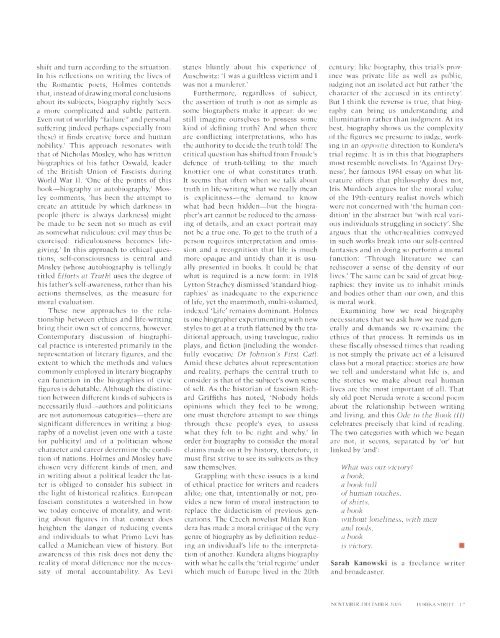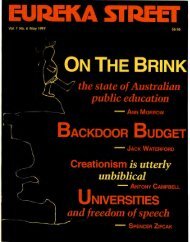0 - Eureka Street
0 - Eureka Street
0 - Eureka Street
Create successful ePaper yourself
Turn your PDF publications into a flip-book with our unique Google optimized e-Paper software.
shift and turn according to the situation.<br />
In hi s reflections on writing the lives of<br />
the Romantic poets, Holmes contends<br />
that, instead of drawing moral conclusions<br />
about its subjects, biography rightly 'sees<br />
a more complicated and subtle pattern.<br />
Even out of worldly "failure" and personal<br />
suffering (indeed perhaps especially from<br />
these) it finds creative force and human<br />
nobility.' This approach resonates with<br />
that of Nicholas Mosley, who has written<br />
biographies of his father Oswald, leader<br />
of the British Union of Fascists during<br />
World War II. 'One of the points of this<br />
book- biography or autobiography,' Mosley<br />
comments, 'has been the attempt to<br />
create an attitude by which darkness in<br />
people (there is always darkness) might<br />
be made to be seen not so much as evil<br />
as somewhat ridiculous: evil may tim be<br />
exorcised: ridiculousness becomes lifegiving.'<br />
In this approach to ethical questions,<br />
self-consciousness is central and<br />
Mosley (whose autobiography is tellingly<br />
titled Efforts at Truth) uses the degree of<br />
his father's self-awareness, rather than his<br />
actions themselves, as the measure for<br />
moral evaluation.<br />
These new approaches to the relationship<br />
between ethics and life-writing<br />
bring their own set of concerns, however.<br />
Contemporary discussion of biographical<br />
practice is interested primarily in the<br />
representation of literary figures, and the<br />
extent to which the methods and values<br />
commonly employed in literary biography<br />
can function in the biographies of civic<br />
figures is debatable. Although the distinction<br />
between different kinds of subjects is<br />
necessarily fluid-authors and politicians<br />
are not autonomous categories-there are<br />
significant differences in writing a biography<br />
of a novelist (even one with a taste<br />
for publicity) and of a politician whose<br />
character and career determine the condition<br />
of nations. Holmes and Mosley have<br />
chosen very different kinds of men, and<br />
in writing about a political leader the latter<br />
is obliged to consider his subject in<br />
the light of historical realities. European<br />
fascism constitutes a watershed in how<br />
we today conceive of morality, and writing<br />
about figures in that context does<br />
heighten the danger of reducing events<br />
and individuals to what Primo Levi has<br />
called a Manichean view of history. But<br />
awareness of this risk does not deny the<br />
reality of moral difference nor the necessity<br />
of moral accountability. As Levi<br />
states bluntly about his experience of<br />
Auschwitz: 'I was a guiltless victim and I<br />
was not a murderer.'<br />
Furthermore, regardless of subject,<br />
the assertion of truth is not as simple as<br />
some biographers make it appear: do we<br />
still imagine ourselves to possess some<br />
kind of defining truth And when there<br />
are conflicting interpretations, who has<br />
the authority to decide the truth told The<br />
critical question has shifted from Froude's<br />
defence of truth-telling to the much<br />
knottier one of what constitutes truth.<br />
It seems that often when we talk about<br />
truth in life-writing what we really mean<br />
is explicitness-the demand to know<br />
what had been hidden-but the biographer's<br />
art cannot be reduced to the amassing<br />
of details, and an exact portrait may<br />
not be a true one. To get to the truth of a<br />
person requires interpretation and omission<br />
and a recognition that life is much<br />
more opaque and untidy than it is usually<br />
presented in books. It could be that<br />
what is required is a new form: in 1918<br />
Lytton Strachey disrnissed 'standard biographies'<br />
as inadequate to the experience<br />
of life, yet the mamm.oth, multi-volumed,<br />
indexed 'Life' remains dominant. Holmes<br />
is one biographer experimenting with new<br />
styles to get at a truth flattened by the traditional<br />
approach, using travelogue, radio<br />
plays, and fiction (including the wonderfully<br />
evocative Dr John son's First Cat).<br />
Amid these debates about representation<br />
and reality, perhaps the central truth to<br />
consider is that of the subject's own sense<br />
of self. As the historian of fascism Richard<br />
Griffiths has noted, 'Nobody holds<br />
opinions which they feel to be wrong;<br />
one must therefore attempt to see things<br />
through these people's eyes, to assess<br />
what they felt to be right and why.' In<br />
order for biography to consider the moral<br />
claims made on it by history, therefore, it<br />
must first strive to see its subjects as they<br />
saw themselves.<br />
Grappling with these issues is a kind<br />
of ethical practice for writers and readers<br />
alike; one that, intentionally or not, provides<br />
a new form of moral instruction to<br />
replace the didacticism of previous generations.<br />
The Czech novelist Milan Kundera<br />
has made a moral critique of the very<br />
genre of biography as by definition reducing<br />
an individual's life to the interpretation<br />
of another. Kundera aligns biography<br />
with what he calls the 'trial regime' under<br />
which much of Europe lived in the 20th<br />
century: like biography, this trial's province<br />
was private life as well as public,<br />
judging not an isolated act but rather 'the<br />
character of the accused in its entirety'.<br />
But I think the reverse is true, that biography<br />
can bring us understanding and<br />
illumination rather than judgment. At its<br />
best, biography shows us the complexity<br />
of the figures we presume to judge, working<br />
in an opposite direction to Kundera's<br />
trial regime. It is in this that biographers<br />
most resemble novelists. In 'Against Dryness',<br />
her famous 1961 essay on what literature<br />
offers that philosophy does not,<br />
Iris Murdoch argues for the moral value<br />
of the 19th-century realist novels which<br />
were not concerned with 'the human condition'<br />
in the abstract but 'with real various<br />
individuals struggling in society'. She<br />
argues that the other-realities conveyed<br />
in such works break into our self-centred<br />
fantasies and in doing so perform a moral<br />
function: 'Through literature we can<br />
rediscover a sense of the density of our<br />
lives.' The same can be said of great biographies:<br />
they invite us to inhabit minds<br />
and bodies other than our own, and this<br />
is moral work.<br />
Examining how we read biography<br />
necessitates that we ask how we read generally<br />
and demands we re-examine the<br />
ethics of that process. It reminds us in<br />
these fiscally obsessed times that reading<br />
is not simply the private act of a leisured<br />
class but a moral practice: stories arc how<br />
we tell and understand what life is, and<br />
the stories we make about real human<br />
lives are the most important of all. That<br />
sly old poet Neruda wrote a second poem<br />
about the relationship between writing<br />
and living, and this Ode to the Book (II)<br />
celebrates precisely that kind of reading.<br />
The two categories with which we began<br />
arc not, it seems, separated by 'or' but<br />
linked by 'and':<br />
What was our vicLory{<br />
a book,<br />
a book full<br />
of human touches,<br />
of shirts,<br />
a book<br />
without loneliness, with men<br />
and tools,<br />
a book<br />
is victory.<br />
Sarah Kanowski is a freelance writer<br />
and broadcaster.<br />
•<br />
NOVEMBER- DECEMBER 2005 EU REK A STREET 17
















